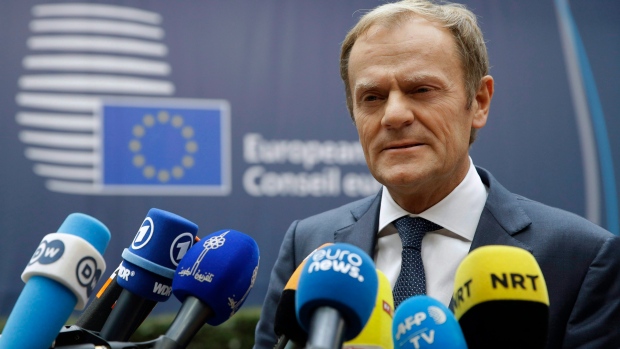Oct 26, 2016
CETA may still be signed Thursday, European Council president Tusk says
, Reuters

BRUSSELS - A planned EU-Canada summit to sign a free trade deal was still possible on Thursday, European Council President Donald Tusk said on Wednesday, as Belgian politicians entered a second day of talks on the future of the pact.
Prime Minister Charles Michel hosted talks from early on Tuesday of regional authorities, including of Wallonia and Brussels that have rejected an accord backed by all 27 other EU governments.
The talks paused after two hours to allow some of those present to attend a funeral of a Belgian politician. They were scheduled to resume at 1500 CET (1300 GMT).
Without assent from its regions and linguistic communities, Belgium cannot sign the Comprehensive Economic and Trade Agreement (CETA) at a planned EU-Canada summit on Thursday to be attended by Canadian Prime Minister Justin Trudeau.
"I still hope that Belgium will prove that it is a consensus-building champion and that we will be able to finalize this agreement soon," Tusk told a session of the European Parliament.
Tusk said that there would be consequences for Europe's global position if it failed to strike a free trade deal with Canada, "the most European country outside Europe and a close friend and ally."
"But it is too early to go there yet. As we speak, the summit tomorrow is still possible.
European Commission President Jean-Claude later told the parliament he was optimistic that there would be an agreement in the course of the day, but it was not clear whether this would allow a signing on Thursday.
"When it happens is less important that than it happens," he said.
Belgium's federal government failed in six hours of negotiations on Tuesday to overcome the regional veto centered on agricultural imports and an investment court system that critics say can be abused by multinationals to dictate public policy.
Paul Magnette, the Socialist premier of Wallonia, said he was not looking for Ottawa to relaunch negotiations.
"Between the EU and Canada the agreement is closed and we are very happy with that, but we still have some problems in Europe and Belgium and we're doing our best to solve them," he told reporters as the talks paused.
Oliver Paasch, head of Belgium's 76,000-strong German-speaking community which also wants improvements, said progress has been made on the investment court issue, with agriculture still needing to be discussed. An entire package would be discussed from Wednesday afternoon.
"Today we see that the European Commission has made many concessions, I believe an agreement is possible, also within Belgium," he told Reuters television.
Only the Michel's center-right federal government and the Dutch-speaking Flanders region, with a majority of Belgium's population, supports CETA as it stands.

